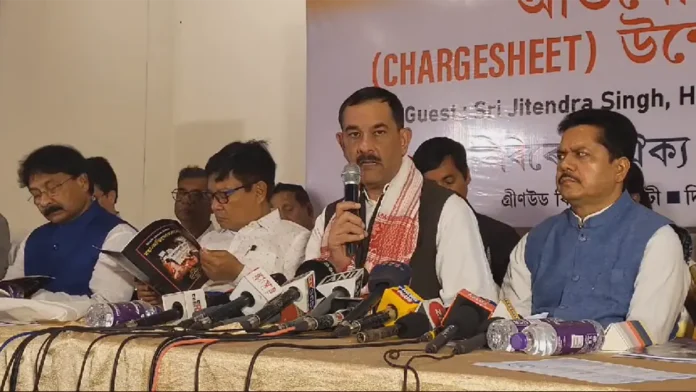The political landscape of Assam has been rocked by allegations of corruption and nepotism as the opposition forum of the state released a damning ‘chargesheet’ implicating the Chief Minister’s family in a purported ‘land scam’. The accusations have ignited a firestorm of controversy, casting a shadow over the integrity of the state’s leadership and prompting calls for a thorough investigation into the alleged misconduct.
The opposition forum, comprising various political parties critical of the ruling administration, unveiled what they described as a meticulously compiled ‘chargesheet’ detailing instances of alleged wrongdoing by individuals associated with the Chief Minister’s family. Central to the allegations is the accusation of involvement in a ‘land scam’, wherein prime parcels of land were purportedly acquired through illicit means, bypassing legal procedures and regulations.
According to the opposition’s claims, members of the Chief Minister’s family allegedly exploited their political influence to secure lucrative land deals, effectively enriching themselves at the expense of the state’s resources and public interest. The ‘chargesheet’ presents a comprehensive overview of the purported irregularities, including instances of land grabbing, unauthorized construction, and manipulation of land records to conceal illicit transactions.
The release of the ‘chargesheet’ has reverberated across Assam’s political landscape, sparking outrage among opposition parties and civil society groups demanding accountability and transparency from the state government. The allegations strike at the heart of governance and integrity, raising profound concerns about the prevalence of corruption and cronyism within the corridors of power.
The timing of the revelations adds a layer of complexity to the unfolding saga, coming amidst heightened political tensions and anticipation ahead of upcoming elections in the state. With public sentiment already charged and political rivalries intensifying, the allegations threaten to become a focal point of contention, shaping the narrative of the electoral discourse and influencing voter perceptions.
The Chief Minister’s office has vehemently denied the allegations, dismissing them as politically motivated smear tactics aimed at tarnishing the reputation of the incumbent administration. In a statement issued in response to the ‘chargesheet’, officials reiterated the government’s commitment to upholding transparency and accountability, pledging to cooperate fully with any independent inquiry into the matter.
However, skepticism abounds among opposition leaders and civil society activists, who view the government’s response as a mere attempt to deflect scrutiny and evade responsibility. Calls for an impartial investigation have grown louder, with demands for the establishment of a judicial inquiry or a probe by an autonomous investigative agency to unearth the truth behind the allegations.
The unfolding controversy has laid bare the fault lines within Assam’s political landscape, underscoring the deep-seated distrust and acrimony between the ruling dispensation and its critics. Against a backdrop of escalating tensions and mutual recriminations, the path forward remains fraught with uncertainty, with the potential for further revelations and escalating confrontations in the days to come.
Beyond the immediate ramifications for the political establishment, the ‘land scam’ allegations strike at the core of governance and accountability, testing the resilience of democratic institutions and the rule of law. The need for robust mechanisms to combat corruption and safeguard the public interest has never been more pressing, underscoring the imperative for transparency, accountability, and ethical leadership in public office.
As Assam grapples with the fallout from the unfolding scandal, the onus lies on all stakeholders – political parties, civil society organizations, and citizens alike – to uphold the principles of integrity and justice. Only through collective vigilance and unwavering commitment to the values of democracy can the state emerge stronger from this crisis, reaffirming its dedication to the ideals of good governance and ethical leadership.


